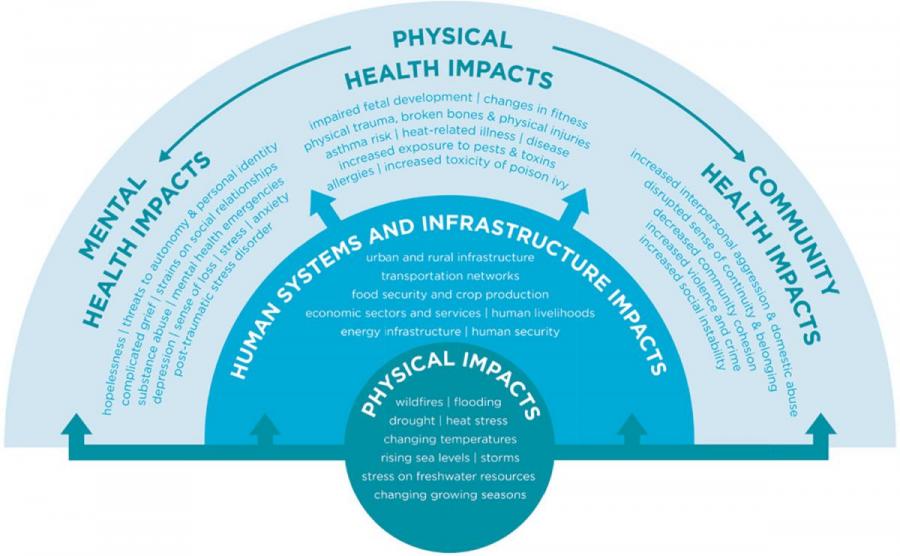
Figure: Mechanisms of climate change impact on human well-being. Reproduced with permission from ref. 98, © 2014 APA and ecoAmerica. doi:10.1038/nclimate2622
Scientists, management agencies, and a broad spectrum of leaders across many aspects of society caution that global changes in climate—such as increasing temperatures and shifting precipitation patterns—can no longer be ignored. Reducing greenhouse gas emissions; safeguarding our agricultural economy and food supply; building stronger, safer water infrastructure; and preparing for climate-related public health crises are at the forefront of discussions and debates worldwide.
But the fields traditionally associated with climate change research—such as geophysics, oceanography, and paleoclimatology—only reveal part of the picture. The natural sciences can’t answer questions about how cognitive processes and social relationships influence the public’s understanding of and engagement with climate change science.
In a new paper published in Nature Climate Change, a team of researchers makes the strong case for the role of psychology in responding and adapting to climate change. Individual behavior ultimately drives social change, the researchers explain, including the adoption of new technologies and support for policies. But research focused on factors that influence decisions and behavior at the individual level hasn’t received the attention it deserves in the debates on climate change.
Susan Clayton, a professor of psychology at the College of Wooster and lead author of the paper, says that psychology is critical to understanding cognitive and emotional tendencies and how they affect human behavior. Integrating psychological research into climate change discussions can help decision makers avoid misunderstandings about human behavior that can lead to ineffective or misguided policies.
“Public perceptions of climate change are affected more strongly by social identities, belief systems, and motivational biases than by scientific knowledge about the topic,” she said. “The psychological perspective is uniquely placed to understand individual factors of human interactions with a changing climate.”
Clayton points out that we’re at a transformative moment for thinking about how human values influence responses to climate change. It’s an important opportunity for psychologists to “lean in” to the climate change dialogue.
“Psychology has more to contribute to the conversation about climate change than has been fully realized,” she says. “Our team encourages psychologists to expand their engagement with important environmental issues through multiple research approaches in order to further their understanding of human behavior, contributions to human well-being, and relevance to other disciplines and to society.”
This work was supported by the National Socio-Environmental Synthesis Center (SESYNC) under funding received from the National Science Foundation DBI-1052875.
The paper, “Psychological research and global climate change,” Susan Clayton, Patrick Devine-Wright, Paul C. Stern, et al., was published online June 24, 2015, in the journal Nature Climate Change.
The National Socio-Environmental Synthesis Center, funded through an award to the University of Maryland from the National Science Foundation, is a research center dedicated to accelerating scientific discovery at the interface of human and ecological systems. Visit us online at www.sesync.org and follow us on Twitter @SESYNC.